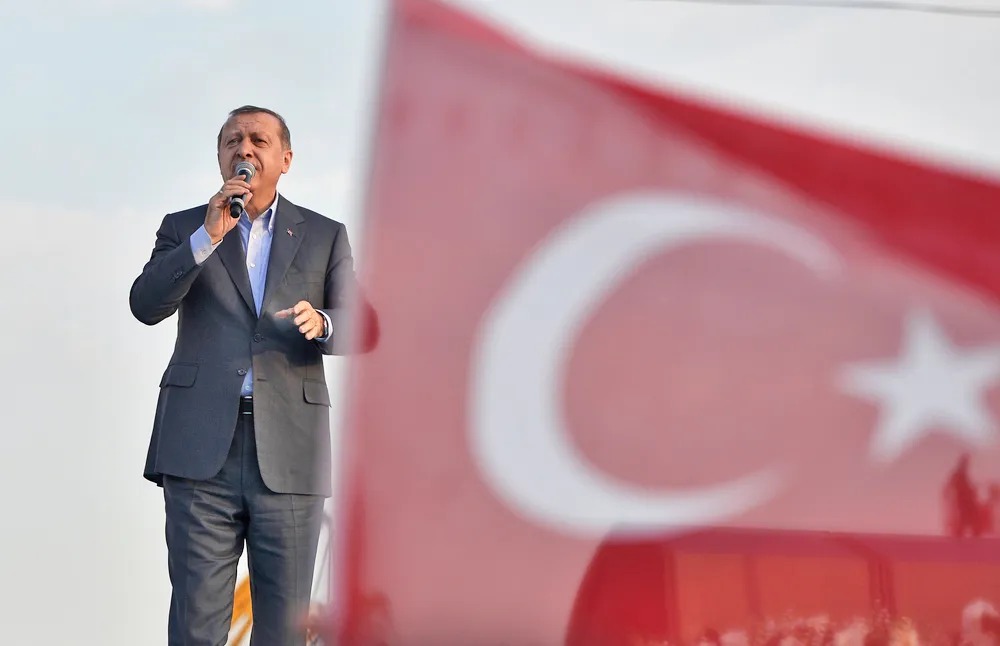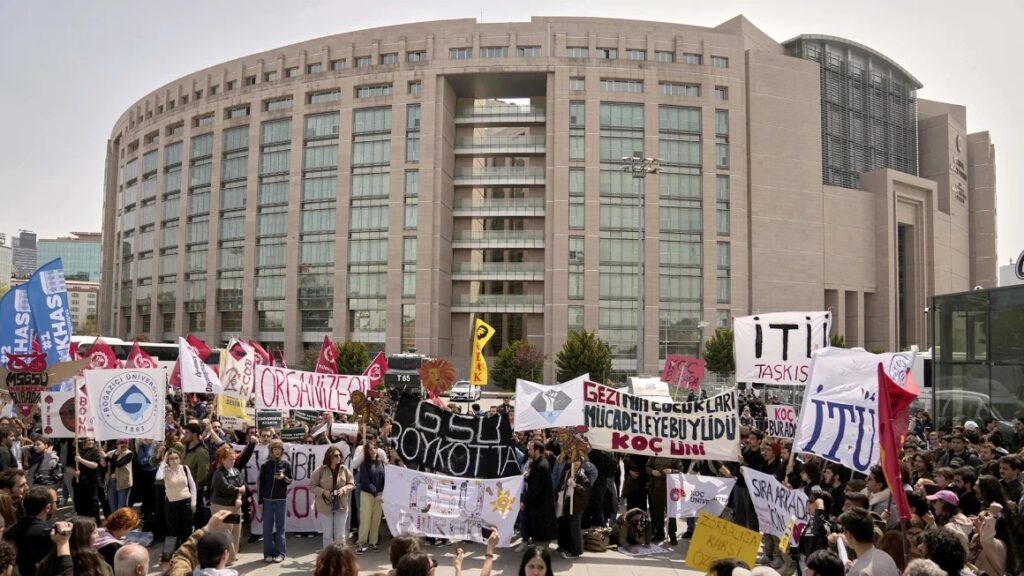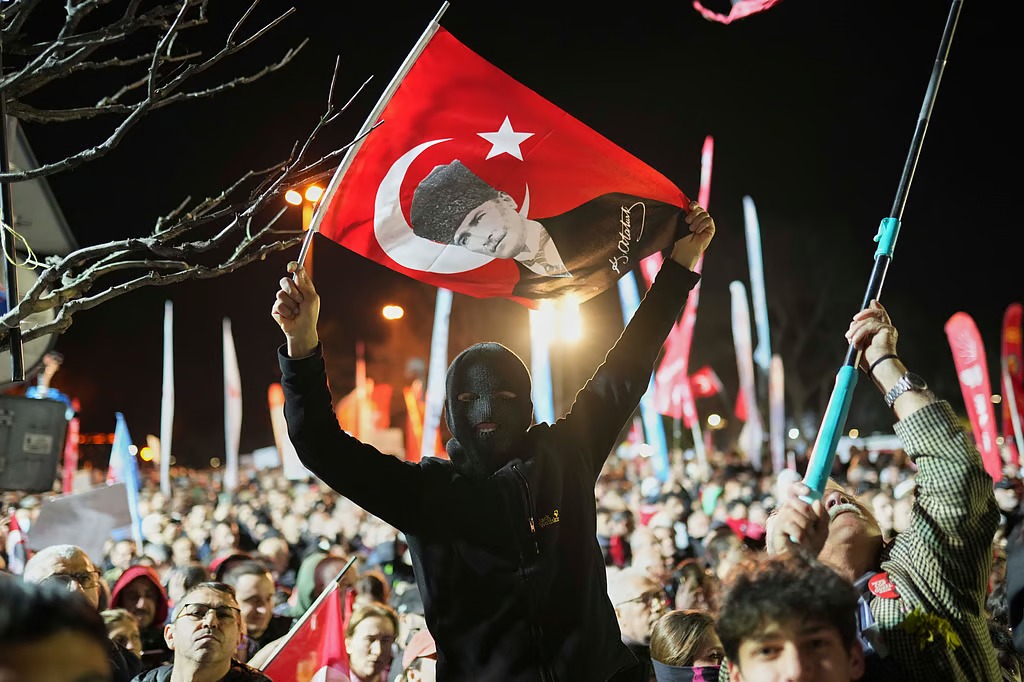
Following a series of international successes, including the downfall of Bashar al-Assad in Syria and a three-nation tour of Malaysia, Indonesia, and Pakistan in February, Turkish President Recep Tayyip Erdogan now faces the most significant political crisis of his career, as thousands of Turks have taken to the streets in opposition to his authoritarian regime.

The protests, which initially began in Istanbul, have rapidly spread to more than 55 of the country’s 81 provinces and show no signs of waning, representing the most substantial challenge to Erdogan and his AKP (Justice and Development Party) since the Gezi Park protests of 2013. While the catalyst for this movement was the arrest and ousting of Istanbul’s mayor, Ekrem Imamoglu, the event has merely unleashed the long-standing frustration among Turks with Erdogan’s policies of democratic erosion and economic mismanagement.
Ekrem Imamoglu assumed the position of Mayor of Istanbul in 2019 and has since been re-elected twice, a testament to his exceptional popularity. He is the prominent figure of the centre-left, pro-secularist CHP (Republican People’s Party), Turkey’s leading opposition party, which has gradually strengthened its influence in the country’s political landscape in recent years. Most notably, the CHP dealt a blow to the AKP by securing victories in 35 out of 81 provinces in the March 2024 municipal elections, including Turkey’s largest metropolitan economic centres, Istanbul and Ankara. The catalyst for the current wave of protests occurred on March 19, when Imamoglu was arrested on charges of corruption in municipal affairs and alleged connections to the banned Kurdish militant group PKK, accusing him of aiding terrorism. However, the latter accusation was dismissed by the court during initial hearings. On March 23, he was subsequently removed from his mayoral position, sparking public outrage over the perceived political nature of the move. It is also significant that a day before his arrest, Istanbul University annulled Imamoglu’s degree, citing irregularities. This decision was widely seen as politically motivated, given that a university degree is a requirement to run for the presidency in Turkey, and Imamoglu was poised to be Erdogan’s main challenger in the 2028 elections. Even as he expressed his intention to contest the annulment in court, Imamoglu remarked, “I have no faith that fair decisions will come out,” highlighting the judiciary’s compromised state under Erdogan’s rule.

Since Recep Tayyip Erdogan assumed leadership of Turkey in 2003 as Prime Minister, and more forcefully after becoming President in 2013, he has pursued a relentless agenda of power consolidation, deeply infiltrating institutions and eroding the checks and balances inherent in a democratic political system. Attempting to reshape Turkey along the lines of ‘neo-Ottomanism,’ Erdogan’s rule has been marked by conservative, populist policies and an increasing centralisation of authority. This was most notably evident during the 2017 constitutional referendum, which Erdogan narrowly won, fundamentally replacing the parliamentary democracy system with an executive presidency. Over the years, Turkey has experienced a rapid slide into authoritarianism, acquiring a notorious reputation for imprisoning an alarming number of political prisoners, human rights activists, journalists, and other dissenters. The 2023 report by the Committee to Protect Journalists (CPJ) ranks Turkey as the 10th worst jailer of journalists globally. In addition to the dire state of political freedoms, Erdogan’s recent years in power have been marked by an ongoing economic crisis, characterised by hyperinflation, a decline in foreign investment, and growing fiscal deficits. These factors have led to a significant deterioration in living standards across the country, accompanied by a sharp rise in poverty and unemployment.

The ongoing anti-regime protests have, unfortunately but predictably, been met with a severe state crackdown, which has involved the use of water cannons, tear gas, plastic pellets, and pepper spray. Over 2,000 individuals have been detained since the demonstrations began, including those who posted on social media condemning the arrest of Istanbul’s mayor, as well as journalists simply covering the protests, with one BBC correspondent even being deported from the country. On April 6, the leader of the CHP, Ozgur Ozel, pledged to continue the protests, demanding the release of Imamoglu, who has been nominated as the party’s presidential candidate, and calling for early elections by November of this year. While the CHP is providing political direction to the protests, it is primarily the youth of Turkey who have been at the forefront of challenging Erdogan’s autocratic rule and advocating for democratic and secular reforms. Furthermore, the protests have seen a convergence of diverse social and political groups, including students, leftists, pro-Kurdish factions, and even nationalists traditionally aligned with the AKP, such as the ultranationalist ‘Grey Wolves’. Given Erdogan’s firm control over the state apparatus, both repressive and ideological, in Althusserian terms, it will be exceedingly difficult for the protesters to force him to relinquish any ground. Nonetheless, this moment represents a significant setback for Erdogan’s regime and has galvanised the Turkish populace to fight for their long-suppressed freedoms and economic welfare.